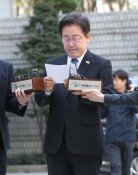Abe visits Pearl Harbor, emphasizing diplomatic tie with U.S.
Abe visits Pearl Harbor, emphasizing diplomatic tie with U.S.
Posted December. 29, 2016 07:10,
Updated December. 29, 2016 07:18
U.S. President Barack Obama and Japanese Prime Minister Shinzo Abe jointly visited the USS Arizona Memorial on Tuesday. The memorial was built over the remains of the USS Arizona, which is the US battleship sank during the Japanese attack on Pearl Harbor in 1941. Abe is the first Japanese leader to visit the USS Arizona Memorial. Abe also visited the National Memorial Cemetery of the Pacific on Monday, where remains of about 53,000 soldiers are buried, and paid silent tribute.
“As the U.S. and Japan reconciled and helped each other after the second world war, it is my wish that people all around the world will continue to remember Pearl Harbor as the symbol of reconciliation,” Abe said. The Japanese attack on Pearl Harbor has left a lasting scar on Americans that never disappears. However, President Obama responded, saying, “Even the deepest wounds of war can give way to friendship and enemies could become allies.” National interests outweigh any other values in the international community and one can never expect an eternal ally or enemy. Abe’s visit to Pearl Harbor has been planned as a friendly gesture of reconciliation to match Obama’s trip to Hiroshima where the U.S. dropped the atomic bomb. Japan has been opting for pragmatism toward its diplomatic approaches. For example, Japan is trying to reaffirm the strong alliance with the U.S. while pursuing to allow its self-defense forces to play increasingly larger roles.
The new U.S. administration led by Donald Trump, China’s aggressive foray into ocean and Russia’s expansion are marking seismic changes in the political landscape of Northeast Asia. Abe, serving as a prime minister for five straight years, has been shifting his policy priority from economy to diplomacy. In line with this, Abe invited 15 global leaders, including Russia’s Vladimir Putin, over the last three months and is planning a trip to the U.S. and Russia next January. Korea seems to be an outcast.
A newly evolving relationship between the U.S. and Japan shows that it is the present that matters more than the past when it comes to friend and enemy in the world of politics. Taking into account current situations in and out of the Korean Peninsula, it is time for Korea to strengthen future-oriented relationships with the U.S and Japan. Unfortunately, most of the frontrunners to be the next president are calling for renegotiation on military sexual slavery between Korea and Japan. If Korea does not abide by a diplomatic agreement it signed with other nations because the results are unsatisfactory, it will only lead to negative reputation and credibility.
Northeast Asia has become a battlefield of “the new cold war,” where the U.S., Japan, China and Russia are going head to head to each other with no compromising. Against this backdrop, a cooperative system for security among Korea, the U.S. and Japan is needed more than ever. In this context, the Korea-Japan agreement on military sexual slavery, if not the best, should have a more significance than just a simple resolution of Japan’s wrongdoing. It must serve as a cornerstone for two nations to pave a pathway for their future. In the meantime, Japanese politicians should refrain from making hostile remarks, hurting integrity and sincerity of the agreement.
angelhuh@donga.com







